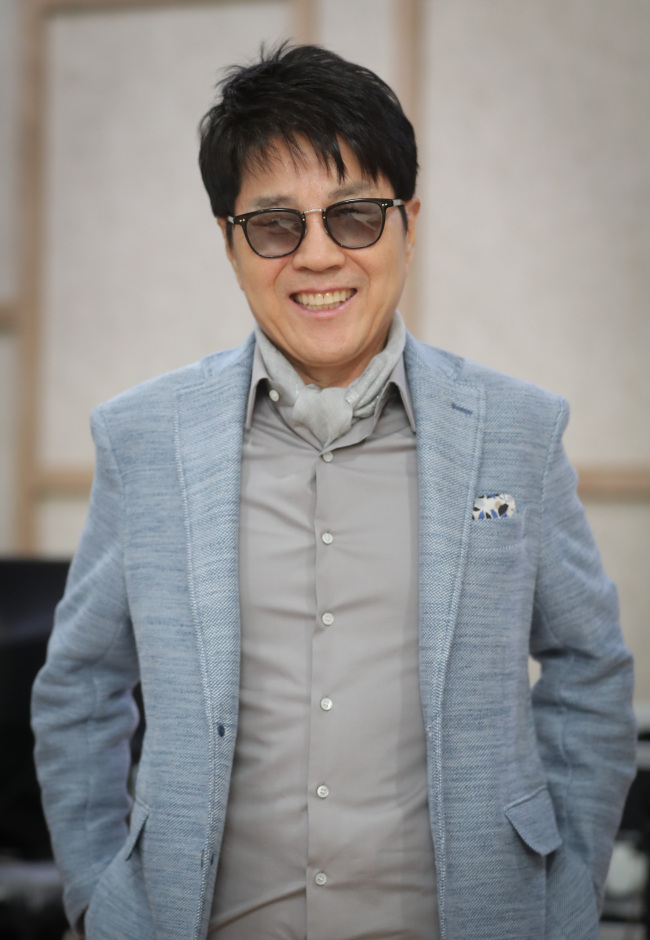Before there was BTS, Psy, Girls’ Generation or Big Bang, there was Cho Yong-pil.
Widely referred to as “Gawang,” which literally means the king of singing, Cho occupies a unique place in the popular music genre in Korea as the O.G. idol singer, pioneer of many genres and the most influential figure in the scene today.
Widely referred to as “Gawang,” which literally means the king of singing, Cho occupies a unique place in the popular music genre in Korea as the O.G. idol singer, pioneer of many genres and the most influential figure in the scene today.

Last week’s concert in Seoul commemorating the 50th anniversary of his debut was a reminder of his prominence in the Korean music scene. The tickets sold out last month, just 10 minutes after sales opened online and tens of thousands of fans flocked the Jamsil Olympic stadium three hours before the performance begin.
Even the pouring rain could not discourage the 45,000 fans that filled the open-air stadium.
As the singer jokingly said it would “take three days to sing all of his songs,” Cho has entertained the fans with an endless array of hits in his half-a-century career. He is the only person who publicly said he will not receive the grand prize at year-end award ceremonies, having won five and six each at KBS and MBC.
His songs have ranked No.1 across local charts at least once in the 1970s, 80s, 90s and 2010s, and most recently with the hit single “Bounce” off the album “Hello” in in 2013.
The song was particularly special in that it adopted an upbeat, “bouncy” tune that was unlike any of his previous songs. As the legendary vocalist said in his April press conference, the key to staying relevant has been to study the latest trends in music, which he has done throughout his storied career.
Born in 1950, the singer started off in the late 1960s as a guitarist and singer playing for the Eighth US Army stationed in South Korea. For the next decade, he performed in several bands, including the Kim Trio that he formed in 1971.
The high point during the time was his solo debut “Come Back to Busan Port” in 1976, with which he cracked into the mainstream music scene. The following year however, he was accused of smoking marijuana and was banned from performing until 1979.
That year he formed the band “Cho Yong-pil and the Great Birth,” and released his first studio album “Woman Outside the Window.” It became the first Korean album in history to hit platinum, heralding his rise as the most successful singer of the next decade.
His popularity was so great that it gave birth to a new slang, “oppa budae.” “Oppa” means older brother but is used by women to refer to any male figure older than herself, and “budae” means troops. The term was coined to refer to a large group of young female fans following an attractive male celebrity, the closest English word being “groupie” but without the sexual connotations as most of “oppa budae” are underage girls.
In 1994, he became the first singer in Korea to have sold more than 10 million records.
Cho’s hits spanning across 50 years and 19 albums are almost too numerous to count, with “The Winter Teahouse,” “Seoul, Seoul, Seoul,” “Empty Space,” “The Leopard of Kilimanjaro,” “Dear Friend,” and “Dream” just scratching the surface of the sizeable archive. Many of his songs are enjoyed even by the younger generation, with songs like “Let’s Go Travel” being remade by K-pop stars like Lee Seung-gi.
“Just as music in the Western world can be divided into before and after the Beatles, Korean music can be divided into before and after Cho,” said Seoul-based pop music critic Im Jin-mo in describing Cho’s status in the Korean music scene.
Cho is more than a superstar, but a pioneer in a range of genres. He was one of the first artists here to try rock in the mainstream music, having started as a guitarist.
His music is also heavily influenced by trot, while also venturing into genres like folk, ballad and even jazz. His hit “Five Hundred Years” is heavily influenced by Korean traditional music.
It is widely known that even the former North Korean leader Kim Jong-il was a fan, his favorite song being “Empty Space.”
In 2005, he held a solo concert at Ryugyong Chung Ju-yung Gymnasium in Pyongyang, becoming the first South Korean pop singer to do so. Cho returned to Pyongyang this April to perform as part of the visiting South Korean art troupe.
Cho was also the first South Korean pop singer to perform at the Carnegie Hall in 1980 and the first to perform in China in 1988, which was before South Korea and China established diplomatic ties.
Outside the records and hits, the most remarkable aspect about the vocalist is that he is not content with what he has, and constantly tries to evolve.
He recently told reporters that he listens to new songs every day, including those of boy bands like BTS and EXO.
Music of today “shocks him” still, he said, pushing him to learn “until the day I die.”
These words indicate the evolution of “Gawang” is far from over, and that he may have plenty of more surprises like “Bounce” up his sleeve in the years to come.
By Yoon Min-sik (minsikyoon@heraldcorp.com)












![[Today’s K-pop] BTS pop-up event to come to Seoul](http://res.heraldm.com/phpwas/restmb_idxmake.php?idx=644&simg=/content/image/2024/04/17/20240417050734_0.jpg&u=)





![[KH Explains] Hyundai's full hybrid edge to pay off amid slow transition to pure EVs](http://res.heraldm.com/phpwas/restmb_idxmake.php?idx=652&simg=/content/image/2024/04/18/20240418050645_0.jpg&u=20240418181020)

![[Today’s K-pop] Zico drops snippet of collaboration with Jennie](http://res.heraldm.com/phpwas/restmb_idxmake.php?idx=642&simg=/content/image/2024/04/18/20240418050702_0.jpg&u=)